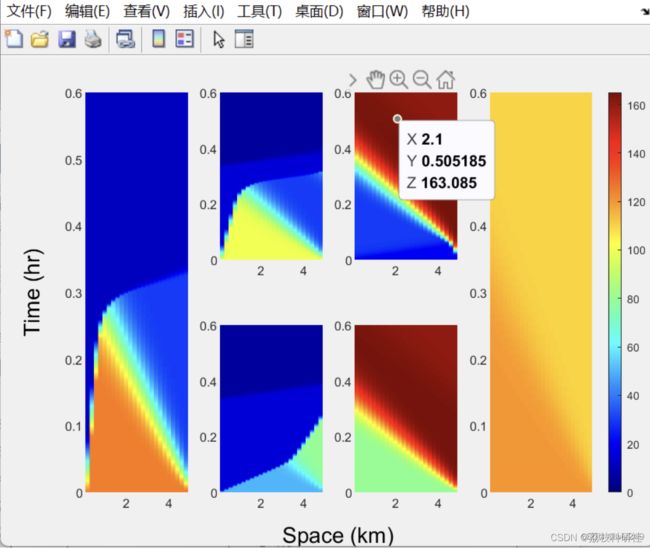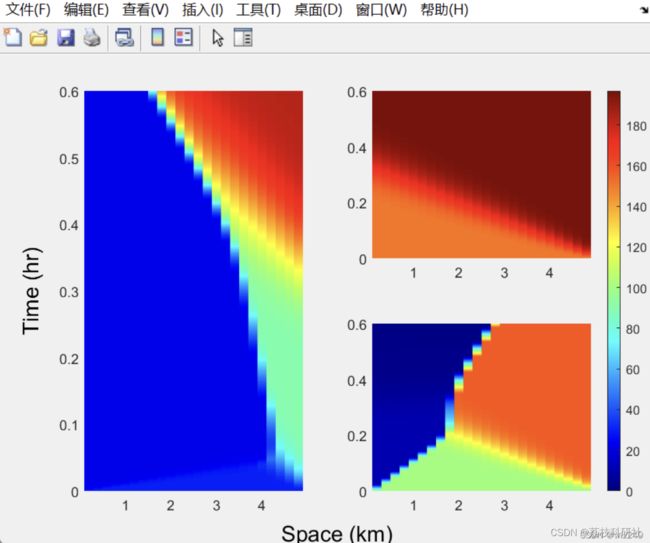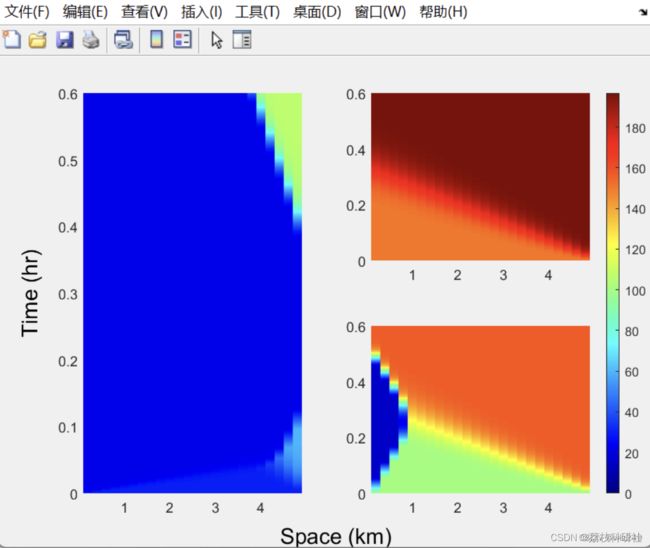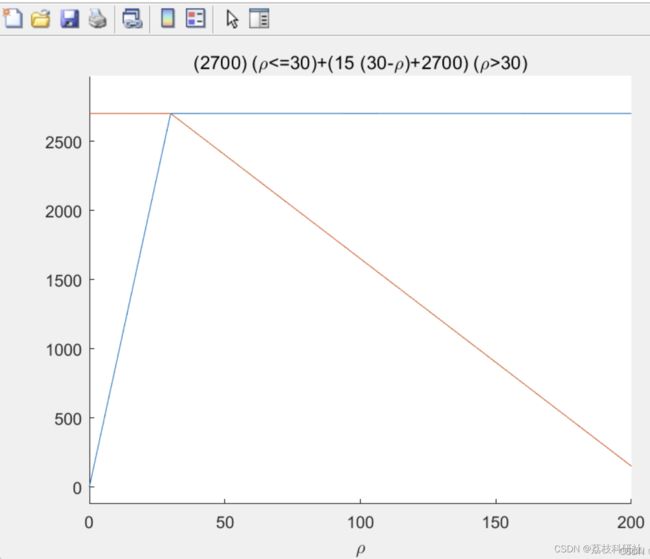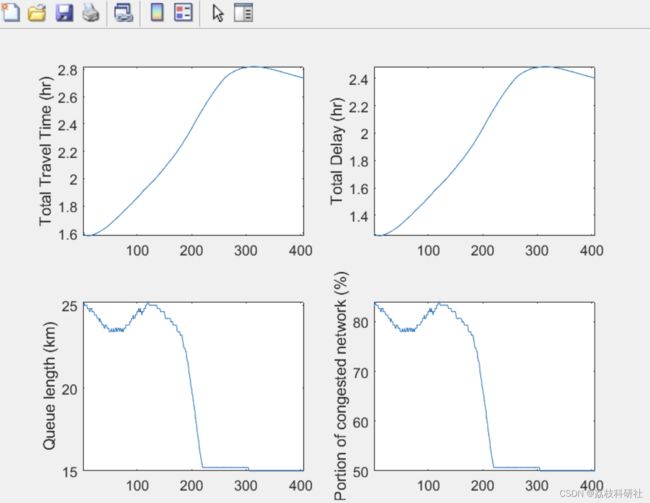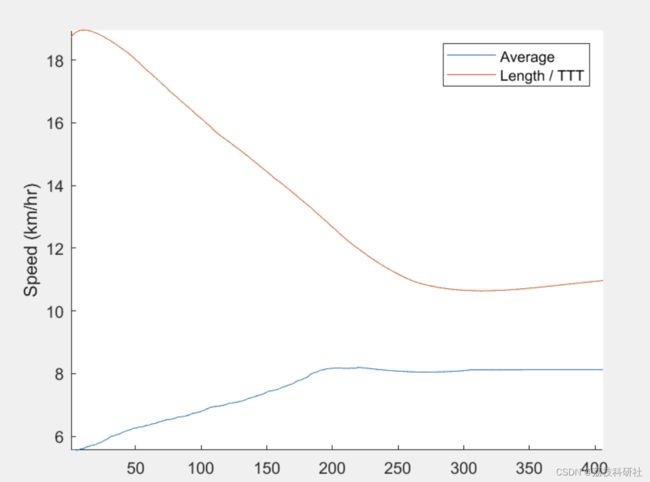- 算法分析与设计实验2:实现克鲁斯卡尔算法和prim算法
表白墙上别挂我
算法笔记经验分享
实验原理(一)克鲁斯卡尔算法:一种用于求解最小生成树问题的贪心算法,该算法的基本思想是按照边的权重从小到大排序,然后依次选择边,并加入生成树中,同时确保不会形成环路,直到生成树包含图中所有的顶点为止。具体步骤:边的排序:将所有边按照权重从小到大排序。初始化:创建一个空的生成树(可以是一个空的图结构),以及一个用于记录每个顶点所属集合(或称为连通分量)的数据结构(例如并查集)。边的选择:依次选择排序
- (面经总结)一篇文章带你整理面试过程中常考的九大排序算法
南淮北安
冲刺大厂之面经总结面经排序算法二分插入冒泡快速
文章目录一、二分插入排序1.原理2.代码二、冒泡排序1.原理2.代码三、插入排序算法1.原理2.代码四、快速排序算法1.原理2.代码五、希尔排序1.原理2.代码六、归并排序1.原理2.代码七、桶排序八、基数排序九、堆排序1.原理2.代码十、总结1.算法分类2.性能分析一、二分插入排序首先必须是排好序的数组,然后通过二分查找,找到合适的位置,插入1.原理二分查找算法又叫作折半查找,要求待查找的序列有
- Python常考面试题汇总(附答案)
TT图图
面试职场和发展
写在前面本文面向中高级Python开发,太基本的题目不收录。本文只涉及Python相关的面试题,关于网络、MySQL、算法等其他面试必考题会另外开专题整理。不是单纯的提供答案,抵制八股文!!更希望通过代码演示,原理探究等来深入讲解某一知识点,做到融会贯通。部分演示代码也放在了我的github的该目录下。语言基础篇Python的基本数据类型Python3中有六个标准的数据类型:Number(数字)(
- opencv-python与opencv-contrib-python的区别联系
剑心缘
零碎小知识pythonopencv
opencv-python包含基本的opencvopencv-contrib-python是高配版,带一些收费或者专利的算法,还有一些比较新的算法的高级版本,这些算法稳定之后会加入上面那个。官网对contrib模块的简介(点击链接跳转)参考链接
- 通信算法之278:数据链/自组网通信设备--MIMO(2T2R)-OFDM系统系列--实际工程应用算法代码--1.系统指标需求及帧结构设计
秋风战士
无线通信基带处理算法MATLAB仿真软件无线电算法无人机经验分享
MIMO(2T2R)-OFDM系统系列–实际工程应用算法代码第一章:系统指标需求拆解分析第二章:通信系统帧结构设计和OFDM参数设计第三章:通信业务速率设计及理论解调门限第四章:同步序列设计及同步性能仿真验证第五章:数据业务设计及性能仿真验证第六章:信道模型设计第七章:接收关键算法设计及仿真验证第八章:其它待补充本文目录MIMO(2T2R)-OFDM系统系列--实际工程应用算法代码一、实际项目:系
- 通信算法之287:通信技术点咨询
秋风战士
MATLAB仿真软件无线电无线通信基带处理算法网络算法无人机经验分享
专业技术咨询方向第一:SFBC编码与解码原理推导第二:SFBC系统中信道均衡推导第三:云哨物理层协议-速率匹配-解调门限-5dB第四:两天线SCFDE系统(SFBC码)帧结构设计第五:两天线OFDM系统(SFBC码)帧结构设计第一:SFBC编码与解码原理推导第二:SFBC系统中信道均衡推导第三:云哨物理层协议-速率匹配-解调门限-5dB第四:两天线SCFDE系统(SFBC码)帧结构设计第五:两天线
- 知识图谱的个性化智能教学推荐系统(论文+源码)
毕设工作室_wlzytw
python论文项目知识图谱人工智能
目录摘要Abstract目录第1章绪论1.1研究背景及意义1.2国内外研究现状1.2.1知识图谱1.2.2个性化推荐系统1.3本文研究内容及创新点1.4全文组织结构第2章相关理论与技术概述2.1知识图谱2.1.1知识图谱的介绍与发展2.1.2知识图谱的构建2.3协同过滤推荐算法2.2.1推荐算法概述2.2.2Pearson相关系数2.2.3Spearman相关系数2.4Bert模型和Albert模
- 反向传播神经网络极简入门
自信哥
单个神经元神经网络是多个“神经元”(感知机)的带权级联,神经网络算法可以提供非线性的复杂模型,它有两个参数:权值矩阵{Wl}和偏置向量{bl},不同于感知机的单一向量形式,{Wl}是复数个矩阵,{bl}是复数个向量,其中的元素分别属于单个层,而每个层的组成单元,就是神经元。神经元神经网络是由多个“神经元”(感知机)组成的,每个神经元图示如下:这其实就是一个单层感知机,其输入是由和+1组成的向量,其
- 【限时干货】Calibre智能分类,轻松突破内网限制畅享电子书库
比头发还脆弱
服务器tcp/iplinux
文章目录前言1.网络书库软件下载安装2.网络书库服务器设置3.内网穿透工具设置4.公网使用kindle访问内网私人书库前言本研究旨在构建一套运行于微软操作系统环境下的独立电子图书管理体系,核心目标是建立可远程操作的资源访问机制。该架构采用高可用性设计,在第三方阅读平台服务中断时仍能保障数字内容传输的稳定性。系统创新性地融合了两大核心技术组件:通过Calibre开源软件实现文献分类算法与格式转换功能
- 【PaddleOCR】OCR文本检测与文本识别数据集整理,持续更新......
博主简介:曾任某智慧城市类企业算法总监,目前在美国市场的物流公司从事高级算法工程师一职,深耕人工智能领域,精通python数据挖掘、可视化、机器学习等,发表过AI相关的专利并多次在AI类比赛中获奖。CSDN人工智能领域的优质创作者,提供AI相关的技术咨询、项目开发和个性化解决方案等服务,如有需要请站内私信或者联系任意文章底部的的VX名片(ID:xf982831907)博主粉丝群介绍:①群内初中生、
- 说话人识别python_基于各种分类算法的说话人识别(年龄段识别)
weixin_39673184
说话人识别python
基于各种分类算法的语音分类(年龄段识别)概述实习期间作为帮手打杂进行了一段时间的语音识别研究,内容是基于各种分类算法的语音的年龄段识别,总结一下大致框架,基本思想是:获取语料库TIMIT提取数据特征,进行处理MFCC/i-vectorLDA/PLDA/PCA语料提取,基于分类算法进行分类SVM/SVR/GMM/GBDT...用到的工具有HTK(C,shell)/Kaldi(C++,shell)/L
- MEMS定向短节相较于磁通门传感器的优势在哪里?
ericco123
MEMS陀螺仪惯性技术制造科技
磁通门传感器得益于其的高精度和稳定性,在地质勘探、电流传感等静态磁场测量场合下被广泛应用。然而,磁通门传感器虽对静态磁场敏感,但在强交变磁场环境中极易受到干扰,从而影响数值精准度。此外,功耗高、响应慢等一系列问题也限制了应用场景。ER-Gyro-19完美解决了这些缺点带来的局限,具备与磁通门传感器兼容的电气接口与机械结构,实现原位替换,在一些磁通门传感器无法应用的场合,尤其是石油天然气测井领域也能
- 深入解析C++中 std::sort背后的实现原理 —Introsort(Introspective Sort)
点云SLAM
C++c++算法数据结构快速排序排序算法堆排序深度优先
Introsort简介Introsort是一种混合排序算法,结合了三种经典算法的优点:算法用于特点快速排序通常情况平均时间复杂度O(nlogn)堆排序当快速排序退化(递归过深)时最坏时间复杂度O(nlogn)插入排序小规模数组时(如长度≤16)常数开销小,快Introsort运行机制排序逻辑如下:if(size2*log2(n))堆排序(HeapSort)else快速排序(QuickSort)快速
- 冒泡排序算法详解(含Python代码实现)
算法_小学生
算法
冒泡排序(BubbleSort)是最基础的排序算法之一,通常用于学习排序算法的入门理解。本文将通过Python代码实现冒泡排序,并详细讲解其原理、执行流程、复杂度分析及适用情况。✨一、算法简介冒泡排序的核心思想是:相邻两个元素比较,将较大的元素不断“冒泡”至右侧,最终实现排序。其基本过程是重复比较相邻的元素,如果顺序错误就交换,重复这一过程,直到没有任何需要交换的为止。二、Python代码实现下面
- 揭秘 Spring Cloud Zuul 在后端的负载均衡策略
大厂资深架构师
SpringBoot开发实战springcloud负载均衡springai
揭秘SpringCloudZuul在后端的负载均衡策略关键词:SpringCloudZuul、负载均衡、微服务网关、Ribbon、请求路由摘要:在微服务架构中,API网关是流量的“总调度员”,而负载均衡则是它的“智能大脑”。本文将以“小区门卫派件”为故事主线,用通俗易懂的语言揭秘SpringCloudZuul如何通过集成Ribbon实现后端负载均衡。我们将从核心概念到算法原理,从代码实战到应用场景
- ImportError: /nvidia/cusparse/lib/libcusparse.so.12: undefined symbol: __nvJitLinkComplete_12_4
爱编程的喵喵
Python基础课程pythonImportErrortorchnvJitLink解决方案
大家好,我是爱编程的喵喵。双985硕士毕业,现担任全栈工程师一职,热衷于将数据思维应用到工作与生活中。从事机器学习以及相关的前后端开发工作。曾在阿里云、科大讯飞、CCF等比赛获得多次Top名次。现为CSDN博客专家、人工智能领域优质创作者。喜欢通过博客创作的方式对所学的知识进行总结与归纳,不仅形成深入且独到的理解,而且能够帮助新手快速入门。 本文主要介绍了ImportError:/home/
- 【NWFSP问题】基于中华穿山甲算法CPO求解零等待流水车间调度问题NWFSP研究(Matlab代码实现)
欢迎来到本博客❤️❤️博主优势:博客内容尽量做到思维缜密,逻辑清晰,为了方便读者。⛳️座右铭:行百里者,半于九十。本文目录如下:目录⛳️赠与读者1概述1.引言2.理论基础2.1中华穿山甲算法(CPO)核心原理2.2NWFSP数学模型3.CPO-NWFSP求解框架设计3.1编码与解码3.2离散化位置更新3.3目标函数适配4.实验设计与性能分析4.1实验设置4.2结果分析4.3敏感性分析5.结论与展望
- Github 2025-07-05 Rust开源项目日报Top10
老孙正经胡说
githubrust开源Github趋势分析开源项目PythonGolang
根据GithubTrendings的统计,今日(2025-07-05统计)共有10个项目上榜。根据开发语言中项目的数量,汇总情况如下:开发语言项目数量Rust项目10TypeScript项目1uv:极快的Python软件包安装程序和解析器创建周期:147天开发语言:Rust协议类型:ApacheLicense2.0Star数量:7066个Fork数量:200次关注人数:7066人贡献人数:45人O
- LRU Cache
Mr_Xuhhh
c++c语言算法开发语言python
LRUCache定义缓存算法(LeastRecentlyUsed)核心思想最近最少使用或最久未使用。当缓存空间不足时,它会优先淘汰最长时间没有访问的数据项类比:图书馆的书架管理,经常被借阅的书放在最前面方便取用,而长期无人问津的书会被移到后面或下架数据结构选择与设计1)双向链表1.用于维护元素的访问顺序,最近访问的元素放在链表头部,最久未被访问的放在尾部2.支持O(1)时间复杂度的任意位置插入和删
- 【Python】simulink与python联合仿真
1.1Simulink的边界:事件驱动、算法复杂性与AI集成瓶颈Simulink的核心优势在于其强大的微分方程求解器和对连续时间系统、离散时间系统的精确描述能力。其基于“信号流”和“框图”的建模范式,使得工程师可以直观地构建与物理现实高度对应的数学模型。然而,这种优势也带来了其天然的局限性:基于时间的驱动核心(Time-BasedCoreEngine):Simulink的“心脏”是一个时间驱动的仿
- 【PyTorch】教程:torch.nn.GELU
老周有AI~算法定制
PyTorchpytorch深度学习python
torch.nn.GELU原型CLASStorch.nn.GELU(approximate='none')参数approximate(str,optional)–gelu近似算法用none或者tanh,默认为none;定义高斯误差线性单元函数GELU(x)=x∗ϕ(x)\text{GELU}(x)=x*\phi(x)GELU(x)=x∗ϕ(x)其中ϕ(x)\phi(x)ϕ(x)为高斯分布的累积分布
- 数据结构之栈实验
lannnn_
学习记录数据结构c语言栈
栈实验实验目的实验环境实验要求实验内容源代码运行结果实验目的掌握栈这种数据结构特性及其主要存储结构,并能在现实生活中灵活运用。实验环境CodeBlocks实验要求1.熟悉c语言的语法知识;2.掌握栈的顺序存储结构—顺序栈的定义、构造、获得栈顶元素、入栈、出栈等基本操作;实验内容完成栈的定义、构造、获得栈顶元素、进栈、出栈等函数的编写。要求在主函数中实现对以上操作的调用,编写一个算法判断给定的字符向
- 新手必看:入行大模型前一定要知道的几件事!
和老莫一起学AI
人工智能java机器学习大模型算法程序员转行
大模型怎么转?适合哪些人?哪些方向对新手友好?又有哪些坑你必须避开?文章有点长,但全是我这几年观察下来最真实的经验,如果你真的想搞懂大模型、入场不踩坑,建议认真读完,或先收藏慢慢看。一、大模型≠ChatGPT,先搞清“全景图”再出发说句真话,很多人对“大模型”的第一印象就是——ChatGPT。但这只是它的"最上层",底下的基建、平台、算法、数据处理、推理部署……才是撑起整个技术栈的骨架。入行大模型
- php字符串匹配算法,字符串查找算法及原理
面试题:判断字符串是否在另一个字符串中存在?面试时发现好多人回答不好,所以就梳理了一下已知的方法,此文较长,需要耐心的看下去。从实现和算法原理两方面解此问题,其中有用PHP原生方法实现也有一些业界大牛创造的算法。实现方法一:语言特性-内置函数/*strpos示例*///testecho'match:',strpos('xasfsdfbk','xasfsdfbk')!==false?'true':'
- 字符串的两种模式匹配算法--暴力法与KMP算法
对于字符串而言,最常见的基本操作莫过于查找某一字符串(模式串)在另一字符串(主串)中的位置,这一操作过程叫做字符串的模式匹配,常见的模式匹配算法有朴素模式匹配算法和KMP模式匹配算法,下面结合代码对这两种模式匹配算法的思想做个总结。参考博客:很详尽的KMP算法(厉害)1.朴素模式匹配算法(暴力法)朴素模式匹配算法的思想就是,把主串中的每一个字符作为子串开头,与要匹配的字符串进行逐字符匹配,直到所有
- DTW 动态时间规整:时间序列的柔性桥梁
在时间的长河中,数据如浪花般不断涌现,而时间序列数据更是其中璀璨的存在。当我们试图比较两段时间序列时,常常会遇到一个棘手的问题:就像两位舞者,他们演绎着相同的舞蹈,却有着不同的节奏与速度,直接对比难以判断二者的相似度。而DTW(DynamicTimeWarping,动态时间规整)算法,就像一座神奇的柔性桥梁,能够跨越时间节奏的差异,精准度量时间序列间的相似性,在众多领域发挥着不可或缺的作用。一、D
- 串---暴力字符串匹配算法实现
KYGALYX
数据结构算法数据结构
暴力字符串匹配算法详解暴力字符串匹配算法(BruteForceStringMatchingAlgorithm)是一种简单的字符串匹配算法,它通过逐个比较主串中的字符与模式串中的字符来进行匹配。虽然这种方法简单直观,但在最坏情况下可能需要多次比较,导致效率较低。本文档将详细介绍暴力字符串匹配算法的原理、步骤以及如何在C语言中实现。1.暴力字符串匹配算法原理1.1主串与模式串主串:待搜索的字符串。模式
- 搜索领域SEO进阶:内容优化与用户体验提升
搜索引擎技术
uxai
搜索领域SEO进阶:从关键词堆砌到用户价值——内容优化与体验升级的实战指南关键词SEO进阶、内容质量、用户体验、E-E-A-T、用户行为信号、结构化数据、页面速度优化摘要当“SEO=关键词堆砌”的时代成为历史,当搜索引擎算法从“识别文字”进化到“理解意图”,SEO从业者正面临一场从“技术投机”到“用户价值”的范式转移。本文将深度拆解搜索领域的进阶策略:从内容优化的核心逻辑(E-E-A-T框架、主题
- 2023年搜索领域的技术认证与职业发展指南
搜索引擎技术
搜索引擎ai
2023年搜索领域的技术认证与职业发展指南关键词搜索领域、技术认证、职业发展、搜索引擎技术、人工智能搜索摘要本指南旨在为搜索领域的从业者和有志于进入该领域的人士提供全面的技术认证与职业发展参考。首先介绍搜索领域的概念基础,包括其历史发展和关键问题。接着阐述相关理论框架,分析不同认证背后的原理。架构设计部分展示搜索系统的组成与交互。实现机制探讨算法复杂度和代码优化。实际应用部分给出实施和部署策略。高
- LRU缓存算法在搜索引擎中的应用
数据结构与算法学习
缓存算法搜索引擎ai
LRU缓存算法在搜索引擎中的应用关键词:LRU算法、缓存淘汰、搜索引擎、哈希表、双向链表、性能优化、访问频率摘要:本文深入探讨了LRU(最近最少使用)缓存算法在搜索引擎中的关键应用。我们将从基本概念出发,通过生活化的比喻解释LRU的工作原理,分析其在搜索引擎架构中的具体实现方式,并通过Python代码示例展示如何构建一个高效的LRU缓存系统。文章还将讨论LRU算法的数学建模、实际应用场景以及未来发
- 统一思想认识
永夜-极光
思想
1.统一思想认识的基础,才能有的放矢
原因:
总有一种描述事物的方式最贴近本质,最容易让人理解.
如何让教育更轻松,在于找到最适合学生的方式.
难点在于,如何模拟对方的思维基础选择合适的方式. &
- Joda Time使用笔记
bylijinnan
javajoda time
Joda Time的介绍可以参考这篇文章:
http://www.ibm.com/developerworks/cn/java/j-jodatime.html
工作中也常常用到Joda Time,为了避免每次使用都查API,记录一下常用的用法:
/**
* DateTime变化(增减)
*/
@Tes
- FileUtils API
eksliang
FileUtilsFileUtils API
转载请出自出处:http://eksliang.iteye.com/blog/2217374 一、概述
这是一个Java操作文件的常用库,是Apache对java的IO包的封装,这里面有两个非常核心的类FilenameUtils跟FileUtils,其中FilenameUtils是对文件名操作的封装;FileUtils是文件封装,开发中对文件的操作,几乎都可以在这个框架里面找到。 非常的好用。
- 各种新兴技术
不懂事的小屁孩
技术
1:gradle Gradle 是以 Groovy 语言为基础,面向Java应用为主。基于DSL(领域特定语言)语法的自动化构建工具。
现在构建系统常用到maven工具,现在有更容易上手的gradle,
搭建java环境:
http://www.ibm.com/developerworks/cn/opensource/os-cn-gradle/
搭建android环境:
http://m
- tomcat6的https双向认证
酷的飞上天空
tomcat6
1.生成服务器端证书
keytool -genkey -keyalg RSA -dname "cn=localhost,ou=sango,o=none,l=china,st=beijing,c=cn" -alias server -keypass password -keystore server.jks -storepass password -validity 36
- 托管虚拟桌面市场势不可挡
蓝儿唯美
用户还需要冗余的数据中心,dinCloud的高级副总裁兼首席营销官Ali Din指出。该公司转售一个MSP可以让用户登录并管理和提供服务的用于DaaS的云自动化控制台,提供服务或者MSP也可以自己来控制。
在某些情况下,MSP会在dinCloud的云服务上进行服务分层,如监控和补丁管理。
MSP的利润空间将根据其参与的程度而有所不同,Din说。
“我们有一些合作伙伴负责将我们推荐给客户作为个
- spring学习——xml文件的配置
a-john
spring
在Spring的学习中,对于其xml文件的配置是必不可少的。在Spring的多种装配Bean的方式中,采用XML配置也是最常见的。以下是一个简单的XML配置文件:
<?xml version="1.0" encoding="UTF-8"?>
<beans xmlns="http://www.springframework.or
- HDU 4342 History repeat itself 模拟
aijuans
模拟
来源:http://acm.hdu.edu.cn/showproblem.php?pid=4342
题意:首先让求第几个非平方数,然后求从1到该数之间的每个sqrt(i)的下取整的和。
思路:一个简单的模拟题目,但是由于数据范围大,需要用__int64。我们可以首先把平方数筛选出来,假如让求第n个非平方数的话,看n前面有多少个平方数,假设有x个,则第n个非平方数就是n+x。注意两种特殊情况,即
- java中最常用jar包的用途
asia007
java
java中最常用jar包的用途
jar包用途axis.jarSOAP引擎包commons-discovery-0.2.jar用来发现、查找和实现可插入式接口,提供一些一般类实例化、单件的生命周期管理的常用方法.jaxrpc.jarAxis运行所需要的组件包saaj.jar创建到端点的点到点连接的方法、创建并处理SOAP消息和附件的方法,以及接收和处理SOAP错误的方法. w
- ajax获取Struts框架中的json编码异常和Struts中的主控制器异常的解决办法
百合不是茶
jsjson编码返回异常
一:ajax获取自定义Struts框架中的json编码 出现以下 问题:
1,强制flush输出 json编码打印在首页
2, 不强制flush js会解析json 打印出来的是错误的jsp页面 却没有跳转到错误页面
3, ajax中的dataType的json 改为text 会
- JUnit使用的设计模式
bijian1013
java设计模式JUnit
JUnit源代码涉及使用了大量设计模式
1、模板方法模式(Template Method)
定义一个操作中的算法骨架,而将一些步骤延伸到子类中去,使得子类可以不改变一个算法的结构,即可重新定义该算法的某些特定步骤。这里需要复用的是算法的结构,也就是步骤,而步骤的实现可以在子类中完成。
- Linux常用命令(摘录)
sunjing
crondchkconfig
chkconfig --list 查看linux所有服务
chkconfig --add servicename 添加linux服务
netstat -apn | grep 8080 查看端口占用
env 查看所有环境变量
echo $JAVA_HOME 查看JAVA_HOME环境变量
安装编译器
yum install -y gcc
- 【Hadoop一】Hadoop伪集群环境搭建
bit1129
hadoop
结合网上多份文档,不断反复的修正hadoop启动和运行过程中出现的问题,终于把Hadoop2.5.2伪分布式安装起来,跑通了wordcount例子。Hadoop的安装复杂性的体现之一是,Hadoop的安装文档非常多,但是能一个文档走下来的少之又少,尤其是Hadoop不同版本的配置差异非常的大。Hadoop2.5.2于前两天发布,但是它的配置跟2.5.0,2.5.1没有分别。 &nb
- Anychart图表系列五之事件监听
白糖_
chart
创建图表事件监听非常简单:首先是通过addEventListener('监听类型',js监听方法)添加事件监听,然后在js监听方法中定义具体监听逻辑。
以钻取操作为例,当用户点击图表某一个point的时候弹出point的name和value,代码如下:
<script>
//创建AnyChart
var chart = new AnyChart();
//添加钻取操作&quo
- Web前端相关段子
braveCS
web前端
Web标准:结构、样式和行为分离
使用语义化标签
0)标签的语义:使用有良好语义的标签,能够很好地实现自我解释,方便搜索引擎理解网页结构,抓取重要内容。去样式后也会根据浏览器的默认样式很好的组织网页内容,具有很好的可读性,从而实现对特殊终端的兼容。
1)div和span是没有语义的:只是分别用作块级元素和行内元素的区域分隔符。当页面内标签无法满足设计需求时,才会适当添加div
- 编程之美-24点游戏
bylijinnan
编程之美
import java.util.ArrayList;
import java.util.Arrays;
import java.util.HashSet;
import java.util.List;
import java.util.Random;
import java.util.Set;
public class PointGame {
/**编程之美
- 主页面子页面传值总结
chengxuyuancsdn
总结
1、showModalDialog
returnValue是javascript中html的window对象的属性,目的是返回窗口值,当用window.showModalDialog函数打开一个IE的模式窗口时,用于返回窗口的值
主界面
var sonValue=window.showModalDialog("son.jsp");
子界面
window.retu
- [网络与经济]互联网+的含义
comsci
互联网+
互联网+后面是一个人的名字 = 网络控制系统
互联网+你的名字 = 网络个人数据库
每日提示:如果人觉得不舒服,千万不要外出到处走动,就呆在床上,玩玩手游,更不能够去开车,现在交通状况不
- oracle 创建视图 with check option
daizj
视图vieworalce
我们来看下面的例子:
create or replace view testview
as
select empno,ename from emp where ename like ‘M%’
with check option;
这里我们创建了一个视图,并使用了with check option来限制了视图。 然后我们来看一下视图包含的结果:
select * from testv
- ToastPlugin插件在cordova3.3下使用
dibov
Cordova
自己开发的Todos应用,想实现“
再按一次返回键退出程序 ”的功能,采用网上的ToastPlugins插件,发现代码或文章基本都是老版本,运行问题比较多。折腾了好久才弄好。下面吧基于cordova3.3下的ToastPlugins相关代码共享。
ToastPlugin.java
package&nbs
- C语言22个系统函数
dcj3sjt126com
cfunction
C语言系统函数一、数学函数下列函数存放在math.h头文件中Double floor(double num) 求出不大于num的最大数。Double fmod(x, y) 求整数x/y的余数。Double frexp(num, exp); double num; int *exp; 将num分为数字部分(尾数)x和 以2位的指数部分n,即num=x*2n,指数n存放在exp指向的变量中,返回x。D
- 开发一个类的流程
dcj3sjt126com
开发
本人近日根据自己的开发经验总结了一个类的开发流程。这个流程适用于单独开发的构件,并不适用于对一个项目中的系统对象开发。开发出的类可以存入私人类库,供以后复用。
以下是开发流程:
1. 明确类的功能,抽象出类的大概结构
2. 初步设想类的接口
3. 类名设计(驼峰式命名)
4. 属性设置(权限设置)
判断某些变量是否有必要作为成员属
- java 并发
shuizhaosi888
java 并发
能够写出高伸缩性的并发是一门艺术
在JAVA SE5中新增了3个包
java.util.concurrent
java.util.concurrent.atomic
java.util.concurrent.locks
在java的内存模型中,类的实例字段、静态字段和构成数组的对象元素都会被多个线程所共享,局部变量与方法参数都是线程私有的,不会被共享。
- Spring Security(11)——匿名认证
234390216
Spring SecurityROLE_ANNOYMOUS匿名
匿名认证
目录
1.1 配置
1.2 AuthenticationTrustResolver
对于匿名访问的用户,Spring Security支持为其建立一个匿名的AnonymousAuthenticat
- NODEJS项目实践0.2[ express,ajax通信...]
逐行分析JS源代码
Ajaxnodejsexpress
一、前言
通过上节学习,我们已经 ubuntu系统搭建了一个可以访问的nodejs系统,并做了nginx转发。本节原要做web端服务 及 mongodb的存取,但写着写着,web端就
- 在Struts2 的Action中怎样获取表单提交上来的多个checkbox的值
lhbthanks
javahtmlstrutscheckbox
第一种方法:获取结果String类型
在 Action 中获得的是一个 String 型数据,每一个被选中的 checkbox 的 value 被拼接在一起,每个值之间以逗号隔开(,)。
所以在 Action 中定义一个跟 checkbox 的 name 同名的属性来接收这些被选中的 checkbox 的 value 即可。
以下是实现的代码:
前台 HTML 代码:
- 003.Kafka基本概念
nweiren
hadoopkafka
Kafka基本概念:Topic、Partition、Message、Producer、Broker、Consumer。 Topic: 消息源(Message)的分类。 Partition: Topic物理上的分组,一
- Linux环境下安装JDK
roadrunners
jdklinux
1、准备工作
创建JDK的安装目录:
mkdir -p /usr/java/
下载JDK,找到适合自己系统的JDK版本进行下载:
http://www.oracle.com/technetwork/java/javase/downloads/index.html
把JDK安装包下载到/usr/java/目录,然后进行解压:
tar -zxvf jre-7
- Linux忘记root密码的解决思路
tomcat_oracle
linux
1:使用同版本的linux启动系统,chroot到忘记密码的根分区passwd改密码 2:grub启动菜单中加入init=/bin/bash进入系统,不过这时挂载的是只读分区。根据系统的分区情况进一步判断. 3: grub启动菜单中加入 single以单用户进入系统. 4:用以上方法mount到根分区把/etc/passwd中的root密码去除 例如: ro
- 跨浏览器 HTML5 postMessage 方法以及 message 事件模拟实现
xueyou
jsonpjquery框架UIhtml5
postMessage 是 HTML5 新方法,它可以实现跨域窗口之间通讯。到目前为止,只有 IE8+, Firefox 3, Opera 9, Chrome 3和 Safari 4 支持,而本篇文章主要讲述 postMessage 方法与 message 事件跨浏览器实现。postMessage 方法 JSONP 技术不一样,前者是前端擅长跨域文档数据即时通讯,后者擅长针对跨域服务端数据通讯,p
